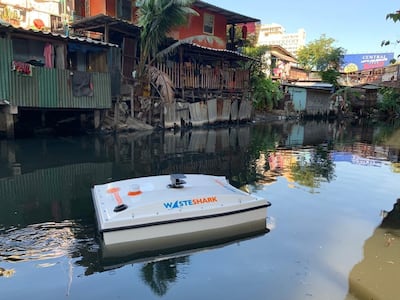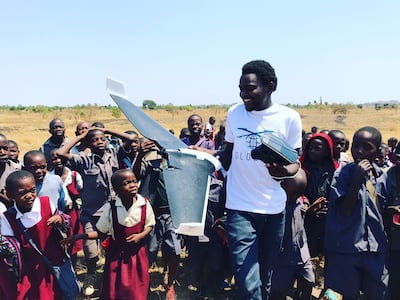This Monday, 10 candidates from a total of 30 finalists will be announced as winners of the 2020 Zayed Sustainability Prize.
The major international award now covers five categories, including health, food, energy and water. Education is addressed through its 'global high schools' category.
This year, finalists include start-ups which have developed technologies to combat plastic waste and the spread of disease, as well as improving access to clean electricity.
The winners will be chosen from across all categories and will each be awarded $600,000 (Dh2.2 million). Here, The National takes a closer look at some of those in contention.
RanMarine Technology
Category: Water
What they do: Remove unwanted plastic and rubbish from waterways
Where: Globally
Plastic pollution has undeniably had a devastating impact on our oceans. For years, marine life and habitats have suffered.
Today, however, one social enterprise is doing its bit to restore the health of beaches, canals and rivers around the world.
RanMarine Technology invented the WasteShark, an autonomous drone which swims through water while clearing waste materials including plastics, oil, toxic algae and invasive plants.
The robot works by sucking up unwanted debris and collecting environmental data to understand changes to water quality.
Its designers say it poses no threat to animals, emits no light or noise pollution and produces zero carbon or greenhouse emissions.
"We chose to target this particular global issue because we love the ocean," Oliver Cunningham, co-founder of the enterprise told The National.
“It is not only the source of all life on Earth, it is also a thing of immeasurable natural beauty and fun.
“We believe that building smarter, cleaner, more efficient cities is the key to ensuring that humans can live sustainably and happily on Earth.

"So we set out to create a tool that serves both cities and the sea.”
RanMarine Technology's long-term goal is to equip every city in the world with a “self-organising swarm of autonomous WasteShark robots”.
One single drone can clear 500kg of debris in a regular working day and the technology costs just five to 10 per cent of similar products.
“We are making good progress," said Mr Cunningham. "Our customers include the World Wide Fund for Nature, the national government of Panama, the South Korean marine environmental agency and various city authorities in Europe and the USA.”
As finalists of this year’s Zayed Sustainability Prize, Mr Cunningham said securing a win would enable his team to establish a mass manufacturing plant.
It would also allow the organisation to develop SharkPod docking stations. “The SharkPod is our newest product, just released," said Mr Cunningham.
"With this docking station a swarm of drones become a responsive, self-organising membrane, continuously cleaning and monitoring the city's water, and preventing waste from reaching the ocean beyond.
“This will make WasteShark the most effective water health management tool in the world. [Winning would also] help us to grow our production capability from two drones per week to 50 drones per week."
Kingo Energy
Category: Energy
What they do: Install solar energy services to families and businesses in off-grid communities
Where: Central and South America
In today’s world, access to energy has become one the biggest restrictions to economic progress.
According to the World Bank, there are currently 940 million people who are not connected to an electricity grid. That translates to about 188 million homes, globally.
This lack of access to basic resources has impacted the way people live but the team behind Kingo Energy has made a pledge to help change this.
It aims to use solar power to bring light into the lives of millions. Based in Guatemala, it first set out to build miniature solar power stations to provide electricity to families in off-grid communities in 2013.
“Imagine living in the dark," said Moralejo Francisco, manager of the scheme. "You live in a remote rural community, speak an indigenous language and are largely disconnected from the modern economy.
“You also pay for the most expensive, hazardous, and dirtiest forms of energy. But the sun shines for all, so why can’t we all benefit from it?”
Inspired to give back to those “largely neglected by the modern energy industry”, Mr Francisco said the initiative was the right thing to do.
“Living without electricity is a fundamental barrier to progress and impacts a wide range of development indicators, including health, education, food security and gender equality,” he said.
Nearly 13 million people in Guatemala, Honduras, Nicaragua, Panama and Colombia lack access to reliable electricity.
Through their project, Kingo Energy has introduced a prepaid energy service to families and businesses in rural villages, and at a lower cost than candles, kerosene or diesel.
“Our ambitious growth goal is to serve all of these unelectrified communities in Guatemala and throughout Central America and northern South America,” said Mr Francisco.
The entrepreneur added that with environment-conscious living at the heart of what the enterprise stood for, the project tackled the United Nations Sustainable Development Goals from two sides.
“It allows our customers to climb the energy ladder into economic progress and it has also created hundreds of jobs, 80 per cent of which are hired directly from the communities,” he said.
Growing from a 450-home pilot scheme in 2015 to providing solar power to more than 50,000 homes today, the goal is to eventually reach millions of users.
“[If we were to win], the prize money will enable us to catalyse our business model to provide energy access to one million users by 2030," Mr Francisco said.
“The funds will also help us increase our user base from 50,000 households today, to 100,000 households by the end of 2020 and 470,000 households by 2024."
Globhe
Category: Health
What they do: Utilise drone data to help prevent and respond to disease outbreaks and natural disasters
Where: Globally
Potentially deadly outbreaks of disease can occur in part due to a lack of information.
Globhe, a Swedish organisation, believes entrepreneurs have a responsibility to help change this.
Using drone data and imaging, the company has created a platform for health disaster prevention and response.
“To date, our Global Drone Data Platform has connected over 3,600 drone pilots in 48 countries who collect drone images on demand to help prevent and respond to disease outbreaks and natural disasters,” said Helena Samsioe, chief operating officer.
Using artificial intelligence to help analyse the collected images faster, pilots and experts on the ground can work together to detect risk factors earlier.
“[We can] identify malaria mosquito breeding sites, cholera risk spots, drought and areas at risk of flooding," said Ms Samsioe. “And we are only at the beginning of what is possible.
“We live in an interconnected world with interconnected challenges and this has inspired us, and other entrepreneurs, to solve some of the world’s biggest issues by utilising the latest technology.
“Today, it is possible to solve old problems in a new way and we are inspired to make it happen. The sky is no longer the limit.”
To date, the Global Drone Data Platform has impacted 100,000 people in addressing cholera and malaria epidemics in Malawi and Lake Victoria.
Speaking about the prize fund, Ms Samsioe said it would provide “crucial financial support to help develop the platform further”.
“[We could] connect to even more drone pilots in even more countries, and develop AI algorithms that can analyse and detect crucial factors from drone images even further to help prevent and respond to disease outbreaks and natural," she said.
“Our end goal is for the Global Drone Data Platform to help improve the lives of 218 million people every year, with a specific target on low-income countries where crucial health and environmental data is lacking.”



